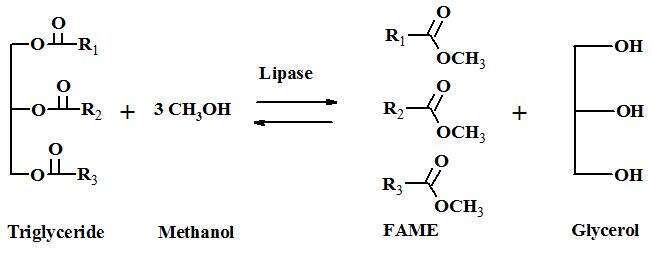
IMMOBILIZATION OF A METHANOL-STABLE LIPASE IN A TERNARY SOL-GEL SYSTEM FOR BIO-DIESEL SYNTHESIS
2Department of Organic Chemistry and Technology, Budapest University of Technology and Economics, Budapest
Under the increasing global demand for sustainable processes and environmental products, fatty acid methyl esters (FAMEs), named biodiesel, offer a promising renewable source of fuel. FAME can be produced both chemically and enzymatically by the methanolysis of triglycerides such as animal fats and plant oils (Fig. 1). While the chemical procedure holds several downstream drawbacks (recovery of glycerol and formation of soap), enzymes have great potential in the field of biodiesel production.
The major drawback of the enzymatic process is the limited stability of lipases which catalyze the reaction, to methanol present in the reaction. Recently, our group has engineered methanol-stable variants of lipase from the thermophilic bacterium Geobacillus stearothermophilus T6 for biodiesel production.

Figure 1: Lipase transesterification reaction to obtain FAME and glycerol
Large scale enzymatic production of biodiesel can become economically feasible by using immobilized enzymes which can be used repeatedly and continuously. There are several mechanisms for lipase immobilization, including adsorption, covalent bonding, entrapment and cross-linking. Our goal is to immobilize the engineered lipase in a sol-gel ternary system involving specific organosilane precursors in order to provide an optimal environment for the lipase activity. Acetylation, methanolysis and esterification reaction tests have shown the great potential of this system for entrapping the lipase in an organic solvent "friendly" matrix. The addition of bulking agent such as skimmed milk powder, improved the thermal stability of this catalyst which is an important feature for the continuous use of the immobilized lipase.
Powered by Eventact EMS